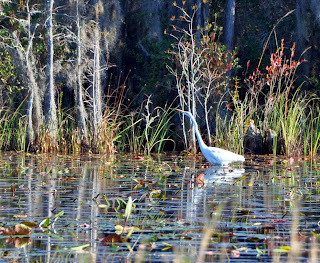The Okefenokee Swamp is a shallow, 438,000 acre peat-filled wetland straddling the Georgia-Florida border. A majority of the swamp is protected by the Okefenokee National Wildlife Refuge. The Okefenokee is the largest "black-water " swamp in North America. The term Okefenokee in Native American is "land of trembling earth". The swamp was designated a National Natural Landmark in 1974.
We stopped here en route to Florida....a visit with my son, Doug and his girlfriend....and our week long stay at Disney. I have always wanted to visit the swamp, so when we found ourselves "in the neighborhood" we drove the 40 miles or so to the swamp and took a boat tour. It was very interesting.
We had just begun our 2 hour boat tour when we spotted this alligator nestled on the side of one of the swamp waterways....he (she?) was just relaxing in a mud bank. We were told there are some 2500 gators in the Okefenokee.
There are many species of birds in the swamp. Flying along our route and staying just ahead of us was this flock of southern ibis and a few wood ducks.

Another species of birds in the Okefenokee is the ever graceful snowy egret. This one was frozen in place....its elegant neck pointed upwards....in hopes it would not be noticed.
"Spanish" moss is everywhere hanging from the bald and pond cypress trees. It seems the local Indians, the Seminoles, coined the term after their first experiences with the Spanish Conquistadors who first came to the area. The moss hung from the trees as the beards did from the conquistadors chins.
The swamp is indeed a series of byways....and large open areas called prairies... very easy to get lost or confused....so journeys out alone are not for the unfamiliar.
These two Tupelo trees mirror each other in the Chesser Prairie part of the Okefenokee. We had a great visit and the swamp remains on our "to do list" as we want to do some swamp kayaking next time we are in the area. If you find yourself near Waycross or Folkston, GA do yourself a favor and visit the swamp. It is fascinating.







No comments:
Post a Comment